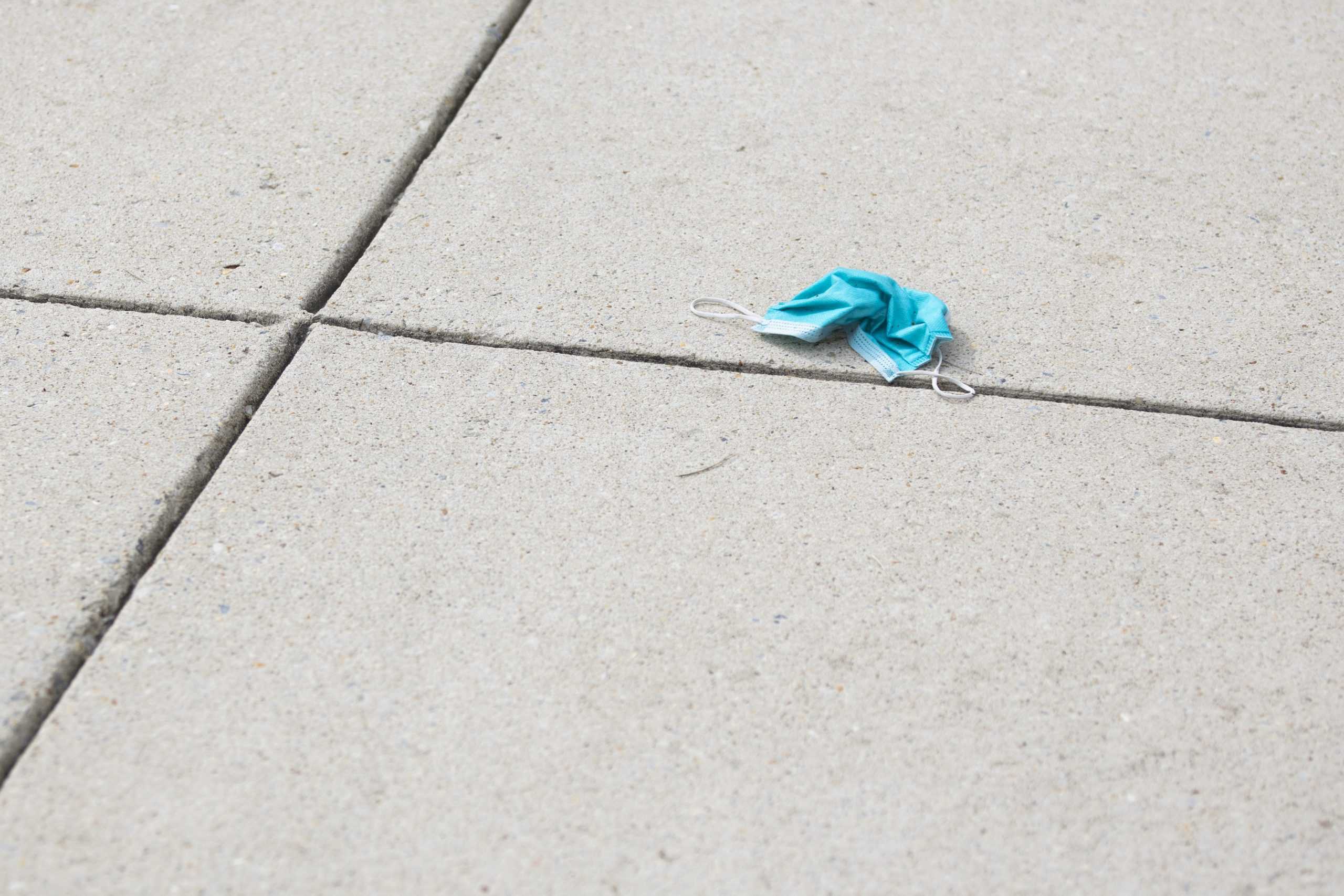As the coronavirus pandemic heads into its second year, used personal protection equipment (PPE) is starting to pile up.
PPE is considered anything that protects those who wear it from the spread of germs or infection. The most common form of PPE during the current pandemic are masks, followed by gloves, gowns and face shields.
Clint Springer, Ph.D., director of Environmental Science and Sustainability Studies and associate professor of biology, said certain sectors have always generated a significant amount of medical waste. But now, everyone is.
“We normally throw away a lot of material because of medical waste,” Springer said. “Now that problem is exacerbated by the fact that we’re all generating medical waste.”
The current surge in PPE use poses a challenge to the global waste management infrastructure, according to a study published in the February 2021 issue of the Journal of Environmental Chemical Engineering. The authors of the study describe “a new type of ‘PPE pollution’ in the land and aquatic environment.”
PPE generally cannot be reused or recycled and most PPE is designed for single use and is made of non-recyclable material.
Even if contaminated PPE cannot be recycled or reused, people can still make sure their masks make it into the trash, Springer said.
“If you go to the Acme parking lot, if you go to one of our parking lots, it’s hard to walk through and not see a disposable mask laying in a parking lot,” Springer said. “What I would really encourage everyone to do is just make sure that they’re disposing of things properly, like all trash.”
Caitlin Thiel ’22, co-president of the Green Fund, an organization that focuses on sustainability at St. Joe’s, also said she encourages members of the community to make sure their PPE is thrown into proper receptacles.
“There have been many instances where these disposable masks and gloves don’t make it into the garbage and are being left laying around,” Thiel said. “It’s really upsetting because there are so many masks I just see thrown all over the grass on campus or next to trash cans.”
Alex Coyle ’22, co-president of the Green Fund, said buying reusable masks is one way to address the problem.
“If you just buy a couple reusable masks, you will have them forever and you can just keep washing them,” Coyle said.
The Centers for Disease Control and Prevention (CDC) recommends that reusable masks have at least two layers of washable material, fit snugly over the face and contain a nose wire. Cloth masks also should be washed regularly in warm water and dried on high heat, according to the CDC’s mask guidelines, updated on Feb. 21.
On March 3, Kathleen Smythe, Ph.D., professor of history and sustainability at Xavier University, co-facilitated a workshop at St. Joe’s titled “Ignatian Pedagogy for Sustainability.”
Smythe said members of Jesuit communities are connected to a long-standing history of caring for the environment.
“We have a very clear mandate to educate as we think about ourselves as one with the planet and seeking an integral ecology,” Smythe said. “Jesuit schools have this really deep wealth of tradition to draw on.”
Yet, for Smythe, sustainability is also about individual actions and choices.
“In the case of masks, it’s just like napkins,” Smythe said. “You can either have a cloth napkin or you can have a paper one that you throw away.”
Thiel and Coyle said the Green Fund is exploring a partnership with TerraCycle, an international recycling company headquartered in Trenton, New Jersey, which is repurposing some PPE and using it to make new products through a process of cleaning, burning and remolding.
Thiel said the Green Fund is looking at the possibility of investing in TerraCycle’s Zero Waste Boxes to place around campus. Through TerraCycle’s initiative, groups can collect used PPE like disposable face masks, visors and disposable gloves and send them to the company to be recycled.
“We were thinking of getting a few of those TerraCycle boxes and putting them around St. Joe’s campus so that people can collect PPE there and dispose of it instead of just putting it in a trash can where it might blow away, or throwing it out their car window,” Thiel said.
Coyle said while the Green Fund stresses the importance of wearing masks, they want everyone to be more mindful of the environmental costs when using single-use products.
“We’re just trying to raise awareness of the lasting effects,” Coyle said. “We want to make people think about the impact on the environment and some more eco-friendly options.”




















































